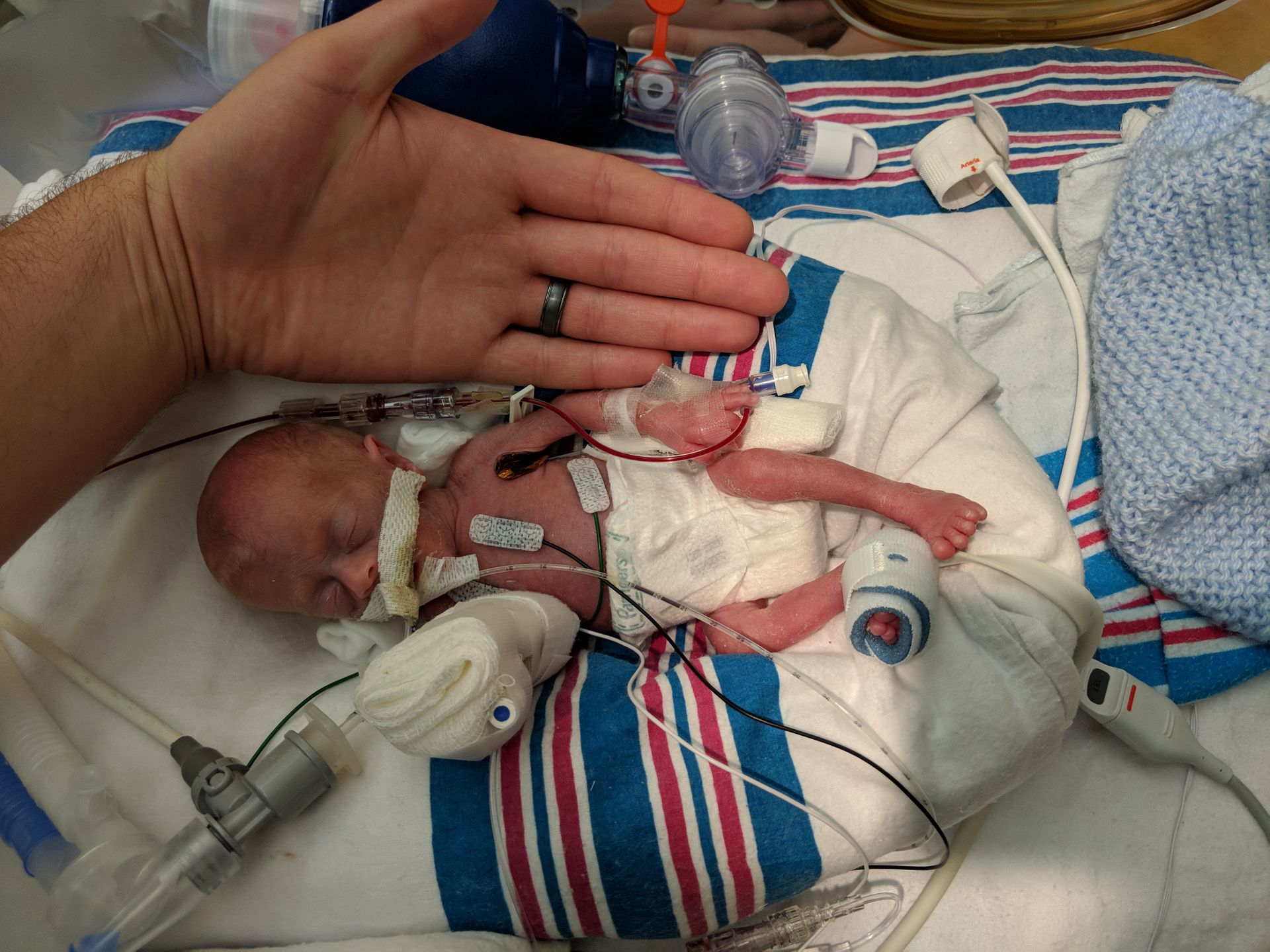


Doctors at AIIMS Bhubaneswar's Department of Paediatric Surgery successfully operated on a premature newborn weighing 1.1kg born with duodenal atresia, an exceptionally rare digestive disorder. The delicate procedure was carried out with precision and skill by a team of paediatric surgeons under the leadership of Manoj Kumar Mohanty. The 1.1kg baby, considered a very low birth weight, surpassed all expectations and is now on a steady path towards recovery. This success has not only brought immense relief to the family but also gained recognition for the department and its skilled doctors.
AIIMS Bhubaneswar Paediatric Surgery Department Performs Life-Saving Surgery on Premature Newborn
Doctors at All India Institute of Medical Sciences (AIIMS) Bhubaneswar's Department of Paediatric Surgery have achieved a remarkable feat by successfully operating on a premature newborn weighing a mere 1.1 kilograms. The baby was born with duodenal atresia, a rare and potentially life-threatening digestive disorder.
Led by Dr. Manoj Kumar Mohanty, a team of paediatric surgeons performed the delicate procedure with precision and skill. Despite the baby's extremely low birth weight and the complexities of the disorder, the surgery was a success.
Background on Duodenal Atresia
Duodenal atresia is a congenital malformation that affects the duodenum, the first part of the small intestine. It occurs when the duodenum is partially or completely blocked, preventing food and fluids from passing into the rest of the digestive tract.
This condition can be life-threatening if left untreated, as it leads to malnutrition and dehydration. It is more common in premature infants and often requires surgical intervention.
Expertise at AIIMS Bhubaneswar
The Paediatric Surgery Department at AIIMS Bhubaneswar has a reputation for excellence in the care of newborn and child patients. Its team of highly skilled surgeons is experienced in performing complex surgeries, including those for rare and life-threatening conditions.
The success of this surgery is a testament to the department's expertise and the dedication of its staff. It has brought immense relief to the baby's family and has garnered recognition for the department and its skilled doctors.
Top 5 FAQs and Answers
1. What is duodenal atresia? Answer: Duodenal atresia is a congenital malformation that affects the duodenum, the first part of the small intestine. It occurs when the duodenum is partially or completely blocked, preventing food and fluids from passing into the rest of the digestive tract.
2. Is duodenal atresia common in premature infants? Answer: Yes, duodenal atresia is more common in premature infants than in full-term babies.
3. What are the symptoms of duodenal atresia? Answer: Symptoms of duodenal atresia include vomiting, abdominal distension, and failure to pass stools.
4. How is duodenal atresia treated? Answer: Duodenal atresia is typically treated with surgery to correct the blockage and allow food and fluids to pass through the digestive tract.
5. What is the prognosis for a baby born with duodenal atresia? Answer: The prognosis for a baby born with duodenal atresia is generally good with early diagnosis and treatment. However, the baby may require ongoing medical care and monitoring to ensure proper growth and development.

ISRO has been making continuous efforts to establish contact with the Vikram lander and Pragyan rover, which were put into sleep mode earlier this month, ahead of the lunar night. However, the prolonged spell of cold weather conditions, reaching up to -150 degrees Celsius, has made it difficult for them to wake up. With the sunrise on the Moon's south polar region and their solar panels believed to be optimally charged now, ISRO is hoping to revive the lander and rover and continue with their experiments and studies. The latest update from ISRO is that the plan to reactivate them has been delayed to September 23 due to the extreme lunar weather conditions.

Monsoon season may bring romantic vibes, but it's also a nightmare for contact lens wearers. Rainwater contains bacteria and pollutants that can cause eye infections, especially when wearing contact lenses. Ophthalmologists recommend using glasses instead and practicing good hygiene to avoid irritation and infection.

India's first human spaceflight mission, Gaganyaan, is one step closer to reality as ISRO successfully tested the main parachutes for the mission's Crew Module. The test, conducted at the Babina Field Firing Range in Uttar Pradesh, is part of the qualification process for the Gaganyaan parachute system. The system, which includes 10 parachutes of different types, is designed to ensure the safe and stable descent of astronauts returning to Earth. This milestone test marks a crucial step forward for India's ambitious space exploration goals.

As World Pneumonia Day is observed on November 12, experts are drawing attention to the dangerous link between air pollution and respiratory illnesses. In India, the post-Diwali smog adds to the already high levels of pollution, increasing the risk of pneumonia, particularly among vulnerable populations. While outdoor air pollution is often blamed, experts emphasize that poor indoor air quality also plays a significant role in triggering and worsening respiratory infections. Health professionals are urging for better air quality regulations and precautions to prevent this deadly connection between pollution and pneumonia.

On November 12, 2025, the world will once again mark World Pneumonia Day, a global health observance highlighting the urgent need to combat one of the leading causes of death, especially in young children. Despite being preventable and treatable, pneumonia continues to claim millions of lives each year, but efforts such as the ‘Every Breath Counts’ coalition and the Global Action Plan for the Prevention and Control of Pneumonia and Diarrhoea are working towards reducing preventable deaths through vaccination and improved healthcare access. Let us continue to raise awareness and take action against this preventable killer.

As an expectant mother, it is important to be aware of the warning signs that could indicate a potential complication during pregnancy. Dr. Swatee Gaggare, a Consultant in Obstetrics & Gynaecology, shares important insights on the key warning signs every pregnant woman should know. These include unusual bleeding or spotting, severe cramps or abdominal pain, and excessive vomiting. Early detection and prompt medical intervention are crucial for a safe outcome for both mother and baby.

November 10 marks World Science Day for Peace and Development, a celebration that highlights the crucial role of science in our daily lives. This year, the event will take place in Samarkand, Uzbekistan, where the theme "Trust, Transformation, and Tomorrow: The Science we Need for 2050" will be explored. Through public engagement and education, scientists aim to address global issues and create a better future for our planet.

On World Tsunami Awareness Day, scientists are highlighting the importance of traditional knowledge in predicting and preparing for tsunamis. Coastal communities have long relied on observing animal behavior to sense environmental changes and predict natural disasters. This technique has proven effective in areas without advanced warning systems. Scientists are now studying these natural warning signs to improve early detection and save lives in vulnerable regions.

Every year, India celebrates the birth anniversary of the renowned physicist CV Raman, who is known for his groundbreaking work on light scattering and the Raman Effect. Despite receiving numerous offers to work in Western labs after winning the Nobel Prize in Physics, Raman remained committed to his belief in fostering a strong scientific culture in India and mentoring future scientists. His discovery of the Raman Effect continues to be relevant and widely used in various fields today, serving as a testament to the quantum nature of light and the energy levels in molecules.

As meditation gains popularity as a mental well-being tool, concerns about potential side effects have emerged. A recent study by a team of researchers from the University of Melbourne delved into the prevalence of adverse experiences among meditators in the United States. By recruiting nearly 900 adults from various meditation skill levels, the study aimed to provide more accurate estimates of how common these side effects are and what factors may contribute to experiencing them. The findings highlight the need for clearer reporting standards in future research on meditation.